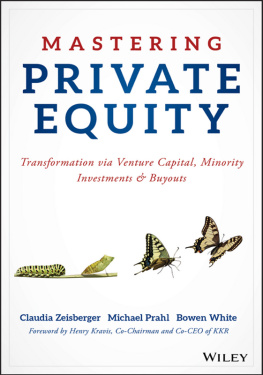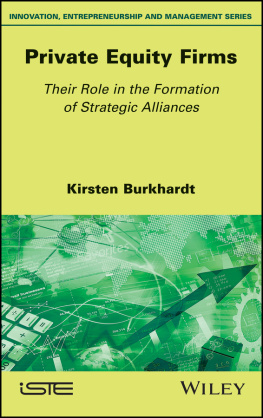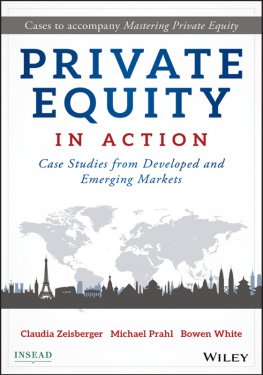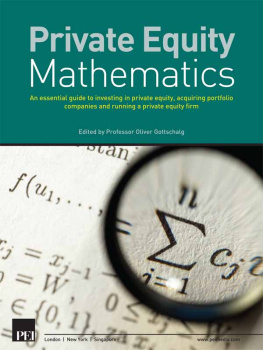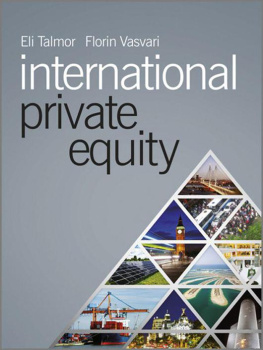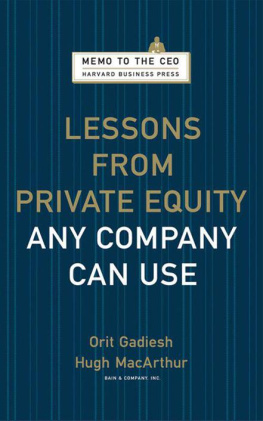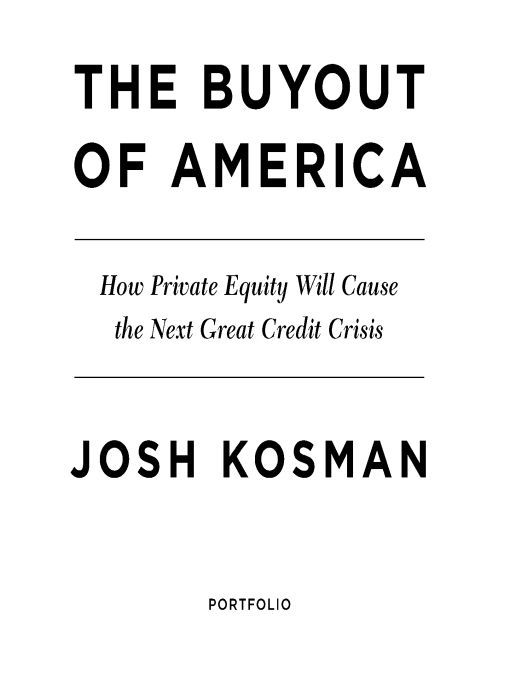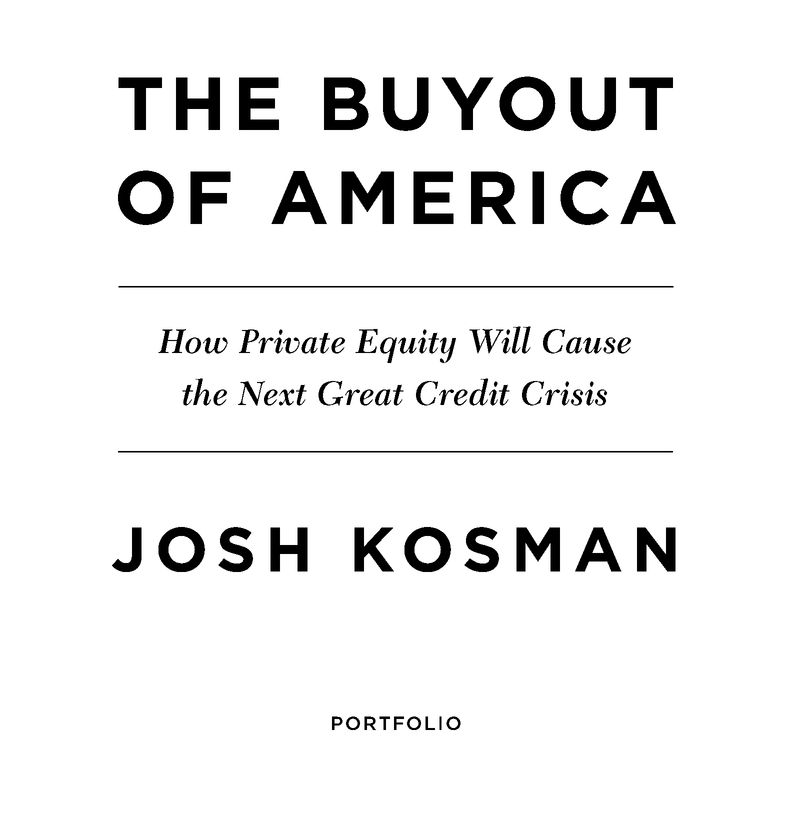Table of Contents
This book is dedicated to the millions of Americans working
for private-equity-owned companies.
Prologue
Youve heard the term, but do you know what it means?
Private equity.
I didnt in 1995 when I applied to work for a private-equity-owned company. I didnt even know it was a private-equity-owned business, but something seemed odd.
At the time, I was twenty-eight years old and beginning a career in journalism. The Middletown Press daily newspaper in central Connecticut listed several openings on the Columbia University Journalism School hotline. It was rare that a paper would suddenly have several positions open. I applied and started to do some research.
Newspaper conglomerate Journal Register Co. had just bought the 111-year-old paper and was cleaning house. They were planning to run some stories from their other area papers in the Middletown Press to reduce editorial expenses. I read in the Hartford alternative weekly that the Journal Register fired experienced reporters, replacing them with those who worked for less. This was troubling. But I got the job and felt maybe there was logic to the cost cutting.
After I arrived, I started viewing things differently. I met a fired longtime political reporter. He seemed like a solid veteran who delivered real news to the community. Where would he go?
I didnt know that PE firms had the companies they acquired borrow most of the money to finance their own sales, forcing them to reduce staff so they could repay their loans.
Within six months I, too, was fired.
Back in New York, I saw a blind-box classified advertisement in the New York Times for a reporter who could deliver scoops. It turned out to be the Buyouts Newsletter, a trade publication covering private-equity firms like Warburg Pincus, which owned Journal Register.
I soon realized the rapacious leveraged-buyout (LBO) kings of the 1980s were still around. They had just adopted a new name, now calling themselves private-equity investors. And I was one of the few reporters following their activities. In the late 1980s, the press closely covered the buyout kings, and Hollywood vilified them in movies like Pretty Woman and Wall Street. But when I joined the Buyouts Newsletter in 1996, they were operating under the radar. They didnt have the money to buy large public companies like RJR Nabisco, so they were quietly acquiring hundreds of smaller businesses, ranging from the Sealy mattress company to J. Crew. I could see that the former LBO kings were staging a comeback. Part of me wanted in.
After about one year of reporting for the Buyouts Newsletter, I wrote to several private-equity executives who had been helpful to me, asking them how one might make the switch from PE journalist to PE professional. Bla Szigethy, who co-ran the private-equity firm The Riverside Co., said he would be glad to offer his thoughts. We met at the ground-floor Rockefeller Center caf and gazed at the ice rink that was just on the other side of our glass partition.
He asked, Why are you interested in joining my firm?
I think you guys are sharp, and what you do is interesting.
Thats not the right answer, he said. The only reason you should want to join us is because you love making money.
This exchange forced me to look at why I wanted to join the industry, and I soon dropped the idea.
By this time, I had started to question the PE firms practices. They ran something of a legal shell game. They bought companies with other peoples money by structuring acquisitions like mortgages: The critical difference was that while we pay our mortgages, PE firms had the businesses they bought take the loans, making them responsible for repayment. Typically PE firms put down cash equal to between 30 percent and 40 percent of the purchase price, and their acquired companies borrowed the rest. They then tried to resell the businesses within five years.
The idea that PE firms put cash into companies was a widely held misconception. PE firms almost always saddled them with the bill and subsequently larger debt. This led to layoffs, like those at the Middletown Press.
PE firms acted differently from hedge funds, which often bought currencies, shares, and debt securitiesnot companies. Private-equity firms werent venture capitalists, either. Venture capitalists invest in growing companies, and they maintain an active oversight role as these companies grow and change. Private-equity firms buy businesses through leveraged buyouts, which means the majority of the money for the buyout comes by loading the company down with debt.
I started seeing, too, the connections between PE barons and important Washington power players, and I began to wonder if that was why they were escaping government regulation. Former president George H. W. Bush and Colin Powell, as well as Clinton cabinet members Erskine Bowles, George Stephanopoulos, and Federico Pea, were working on behalf of private-equity firms. One of the things I found really interesting about the industry was how it reached the highest corridors of power.
Now I switched tactics. I decided to learn as much as I could about private equity to write a book about the industry aimed at a general readership. I felt the public needed to know that many companies were being mortgaged and that they would be the ones paying the price.
In 1998 I broached the idea with fellow Buyouts Newsletter reporter Robert Dunn. We considered titles like The Secret Empire. The plan was to profile three PE barons: Leon Black, Tom Hicks, and Mitt Romney. The son of former Michigan governor George Romney, Mitt Romney even then had barely disguised political ambitions, but this was years before he was ready to run for president.
We began investigating the industry, looking beyond stories that fit only the Buyouts Newsletter, exploring, for example, how PE firm DLJ Merchant Banking Partners had built a company called DecisionOne by acquiring many small companies that serviced computers for corporations and combining them. DLJ had a reputation for firing the heads of most of these businesses, and repricing customer contracts, angering clients. As a result, clients left, and the company eventually went bankrupt.
Soon Robert and I parted ways, taking different career paths. I kept at itlearning more about private equity. After two and a half years at the Buyouts Newsletter, I left for the more widely read Daily Deal newspaper, continuing to report on the sector. The Deal closely covered mergers for a business audience.
In some ways, I felt like a spy. Cozying up to industry sources and trading information on what PE firms were buying and selling, while gathering notes on how PE barons were affecting people and companies.
In 2003, mergermarket, an online news service for Wall Street bankers and lawyers, recruited me to head its North American operations because of my track record of breaking PE stories. I took the job but still thought about the book. Meanwhile, I was one of the few journalists who got to closely witness the PE industrys explosive growth.
By 2007 private equity was the hottest Wall Street craze since the tech boom. It was symptomatic of an era when the faith of both the government and public investors in the stock markets had been shaken by the scandals at Enron and other publicly traded companies and by the tech bust. Corporate managements were reigned in, and stock prices for many businesses went sideways. PE firms armed with cheap debt, though, could pay ever higher multiples of earnings for businesses. They soon found many public businesses within their reach, and from 2001 to 2007 acquired nearly a thousand listed companies.



